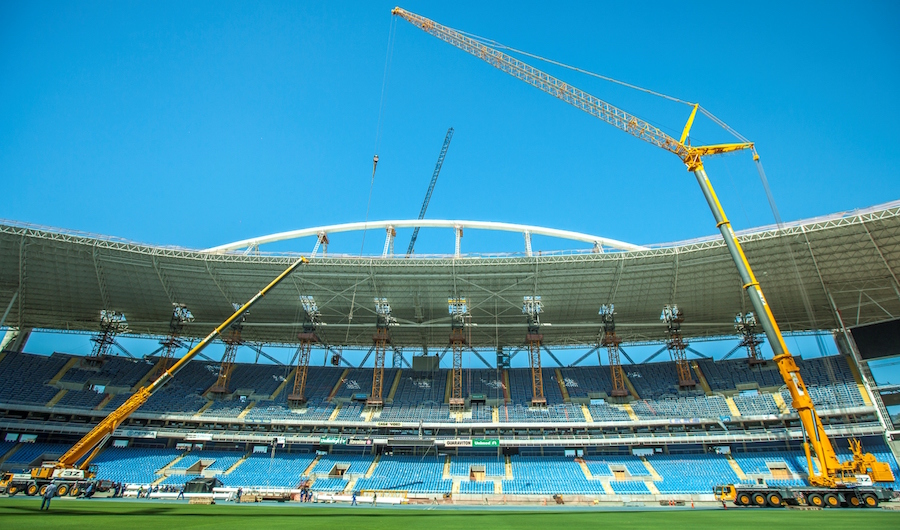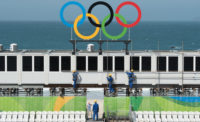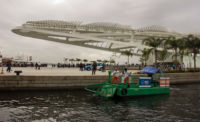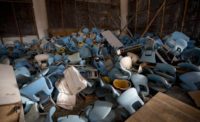As Brazil prepares to host up to 500,000 tourists during the 2016 Summer Olympic Games in Rio de Janeiro, many observers are concerned that construction won't be finished by Aug. 5, the games' starting date.
Further, although the country may have the Zika virus under control, construction firms are coping with late payments for services.
Indeed, Brazil recently has faced several issues: cash woes, caused by the sharp dive in the price of oil; President Dilma Rousseff's forced suspension, which has resulted in political tension; and the two-year-long corruption probe of state-owned oil company Petrobras and some of the country's major construction firms.
Rio de Janeiro is Brazil's largest oil exploration center; now, the state's dwindling tax revenue is jeopardizing the public financing of the remaining construction payments directly linked to the games.
Some observers say the economic crisis is Brazil's worst since the 1930s.
State Gov. Francisco Dornelles on June 17 declared a state of financial emergency and requested federal funds to cover public services during the Olympics, according to Reuters. In a statement, he said emergency measures are needed to avoid "a total collapse in public security, health, education, transport and environmental management," adding that the state needs to "manage the finances very tightly.”
Michel Temer, Brazil's interim president, said the federal government would ensure that all obligations are met to execute the games.
Rousseff was halfway through her presidential term when, on May 12, the Brazilian Senate suspended her for six months. Uncertainty over whether Rousseff's six-month suspension will become permanent has further increased political instability and public dissatisfaction.
Moody's credit-rating agency earlier this month noted that, while the Olympics "will leave a legacy of improvements in the infrastructure of Rio de Janeiro," generating more than $7 billion in regional investment, "it will hardly change the recession-scenario economic conditions in Brazil."
Rio Mayor Eduardo Paes has said the financial emergency "in no way delays the delivery of Olympic projects and the promises assumed by the city of Rio."
He claims that construction is on track for Games venues, with much of the work privately financed.
Payment Worries Contractors
According to industry sources, however, contractors are concerned about when—and whether—they will be paid in full for construction services on the projects. No executives would speak publicly about the issues.
Last month, a contract between Rio officials and constructor Technosolo to build the $35-million velodrome cycling venue ended amid mounting concerns about work delays, according to one online cycling publication. A new contract was awarded to Engetecnica to complete work under the city government's supervision. However, Technosolo contends that it broke the contract because of late government payments and errors in scope documents.
Paes has told the media that the velodrome will not be completed until mid-July but said testing on the track will begin by month's end. The venue originally was scheduled to open last year.
However, project sources say there will be no test event at the velodrome because of the schedule delay.
Thomas Bach, president of the International Olympic Committee (IOC), acknowledged in March that construction workers would still be busy on Aug. 5.
With delays in the transfer of funds by the government for facility construction, some contractors have had to take drastic action.
Contractor Queiroz Galvão, among the firms being probed in the corruption sting, fired 70 employees last year, due to delayed payments on construction of one of the sports complexes. A local engineer involved in renovation of the rowing venue had to abandon work due to nonpayments.
The Metro Line 4—a rail line connecting Ipanema to Barra da Tijuca, which hosts most of the major sporting events—has had to be scaled back due to the cash crunch. The federal government agreed to a $290-million cash payment to the Odebrecht-led contractor consortium in mid-May, after the state missed several debt payments to multilateral banks.
State officials are concerned about the status and adequacy of plans to test the line before its Aug. 1 opening; the officials also want to know the reasons for its cost jumping to $2.9 billion, nearly double earlier estimates. An ABC News report says the ethics probe of Odebrecht includes allegations of bribes related to the company's role in the construction of Line 4.
Full operation of Line 4 will not occur until 2018.
A bus rapid-transit line promised for the Olympic Games will open at the end of June, but with only three of 21 planned stations.
Pollution Worries for Swimmers
Another issue involves the treatment of pollution in Guanabara Bay, which is used for sailing and other water-related Olympics events. Brazil has faced compliance issues regarding the pollution since hosting the 2014 World Cup.
Currently, only two actions are being taken to contain, at least partially, the bay's pollution: The State Institute of the Environment has provided vessels to remove floating waste from the area where sailing events will take place, and barriers have been installed to retain solid waste at the mouths of the rivers that flow into the bay. But both steps are considered to be palliative.
At the Copacabana beach area, where aquatic marathon and triathlon competitions will occur, the Federal University of Rio de Janeiro recently released a water analysis that showed the presence of infection-causing bacteria in the water. However, researchers can't confirm the contamination risk to athletes, so the IOC is moving ahead with events there.
Firms also completed work last fall on repairs to Engenhão Stadium, which was completed in 2007 but closed six years later due to a report issued by the German company SBP, which was hired by the Odebrecht-led building team. The report said the roof could collapse if the stadium encountered winds of more than 65 kilometers per hour.
The builders claimed the problem stemmed from an alleged flaw in the design by the RDR (Racional-Delta-Recoma) consortium, noting that the flaw could have caused excessive misalignment of the stadium’s arches.
After an extensive forensic probe of the roof, RDR concluded that the stadium closure and subsequent reinforcement were unnecessary and that the facility posed no risk.





Post a comment to this article
Report Abusive Comment